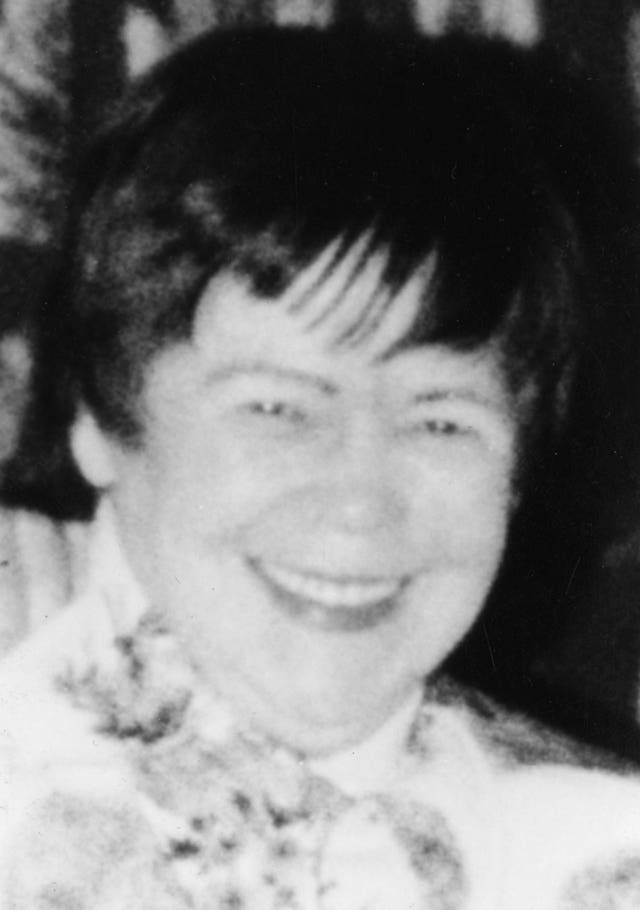The ex-wife of a man accused of murdering a mother of 11 in 1984 has told a court he allegedly confessed to killing a woman because he “just wanted to know what it felt like.”
Mary McLaughlin, 58, was found dead at her home in Partick in Glasgow’s west end in October of that year after spending a night out at bars playing dominoes, the High Court in Glasgow has heard.
Graham McGill, 59, denies murdering her and tightly fastening a belt from her dressing gown around her throat with intent to rape on September 26 or 27 that year.
DNA samples found on her dress, the dressing gown cord, a cigarette end, and a black bra found near her third-floor flat are all attributable to McGill, the court heard on Wednesday.
On Wednesday afternoon, McGill’s ex-wife Suzanne Russell said when they were together he had confessed to her he had murdered a woman but that she did not believe him.

Giving evidence from behind a screen, she told jurors: “He said he went back to her flat, that he had murdered her, that he had strangled her and that he just wanted to know what it felt like.
“He said he used her tights, he said he was shocked at how long it took to actually murder her.
“I said ‘were you not worried that the police are after you?’
“He said ‘no not at all’, he said he wasn’t worried about it at all because she was on her own, she didn’t have anybody and she was more like a prostitute.”
Ms Russell added: “I didn’t believe him… he was threatening me because he didn’t want me breaking up with him.”
She went on: “He said if I ever told anyone he would kill me. He said if I ever repeated it or ever tried to leave him that’s what would happen.”
The pair were together from around 1985, marrying in 1993, before Ms Russell left him in 1999, the court heard.
Earlier, forensic biologist Joanne Cochrane told jurors she had re-examined items of evidence in the 36-year-old cold case with modern techniques she called the “gold standard of DNA profiling”.
She went on: “The finding of semen attributable to Graham McGill on the dress worn by Mary McLaughlin in our opinion would be explained if semen from Graham McGill was deposited on to the dress during some form of sexual activity.
“In our opinion one explanation for the finding of DNA attributable to Graham McGill within the knot of the ligature could be that Graham McGill had held the ligature while tying the knot.”
Under cross-examination by defence counsel Sarah Livingstone, Mrs Cochrane agreed she could not say when the DNA was deposited on the dress and the manner in which it occurred.
Ms Livingstone said: “You’re not saying Graham McGill tied this knot?”
Mrs Cochrane said: “No, we’re considering it as one explanation. We’re aware there could be another explanation,” adding: “We accept the possibility of secondary transfer.”
Ms Russell also denied a suggestion from Ms Livingstone that she only told police about McGill’s alleged confession because he was in custody on suspicion of murder.
A post-mortem examination carried out on October 2 found Ms McLaughlin died of ligature strangulation at least five days previously, jurors heard.
Video of the scene showed her lying on her back in a green dress – worn back to front – with her right arm hanging down the side of the bed and her legs apart.
The level of alcohol in her blood indicated she was “grossly intoxicated” at the time of her death, the court has heard.
The trial has been told that Ms McLaughlin was unemployed, had previously gone by surnames Cullen and Mullen, and had 11 children by two different partners.
McGill was arrested by officers in December 2019 and charged after police interview, the court heard.
He denies another charge of stealing a set of keys from Ms McLaughlin’s flat.
Retired policeman Brian Foster, who worked on the case, told the court that “the belief was that whoever had committed this murder left the door locked and left with the keys.”
McGill also denies a separate charge of threatening to murder Ms Russell and children at a house in Motherwell, North Lanarkshire, between January 1 1985 and December 31 1988.
The trial, before judge Lord Burns, estimated to last up to seven days, continues on Thursday.




Comments: Our rules
We want our comments to be a lively and valuable part of our community - a place where readers can debate and engage with the most important local issues. The ability to comment on our stories is a privilege, not a right, however, and that privilege may be withdrawn if it is abused or misused.
Please report any comments that break our rules.
Read the rules hereComments are closed on this article